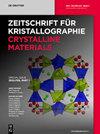Cobalt-bearing adamite from Cap Garonne, Mine du Pradet, France – structural relationship to olivenite and magnetic behavior
IF 2.7
4区 材料科学
Q3 CRYSTALLOGRAPHY
Zeitschrift Fur Kristallographie-Crystalline Materials
Pub Date : 2023-10-09
DOI:10.1515/zkri-2023-0037
引用次数: 0
Abstract
Abstract The crystal structure of cobalt-bearing adamite (Zn, Co) 2 AsO 4 OH (so-called cobalton adamite) from Mine du Pradet, Cap Garonne, France has been refined from single crystal X-ray diffraction data: Pnnm , a = 831.39(4), b = 852.67(6), c = 605.84(6) pm, w R = 0.0568, 901 F 2 values, 48 variables. The composition of the single crystal and the bulk sample with EDX and ICP-OES was determined as Zn 1.94 Co 0.06 (AsO 4 )OH and (Co 0.085 Ni 0.037 Cu 0.270 Zn 1.608 )AsO 4 OH. The Co 2+ , Ni 2+ and Cu 2+ incorporation in the bulk sample leads to Curie paramagnetism with an experimental moment of 2.85 µ B / M 2+ cation and explains the pink color along with the greenish edges. The Raman spectrum shows the characteristic vibrations of the AsO 4 tetrahedra and the M O 5 pyramids as well as the O–H stretching mode. The adamite structure is closely related with the olivenite type (space group P 2 1 / n 11). This structural relationship is discussed on the basis of a group–subgroup scheme (Bärnighausen formalism).法国Pradet矿加隆峰含钴adamite -与橄榄石的结构关系及磁性行为
摘要:利用x射线单晶衍射数据,对法国加隆Cap du Pradet矿含钴adamite (Zn, Co) 2 AsO 4 OH(钴adamite)的晶体结构进行了研究:Pnnm, a = 831.39(4), b = 852.67(6), c = 605.84(6) pm, w R = 0.0568, f2值901,48个变量。用EDX和ICP-OES测定了单晶和样品的组成为Zn 1.94 Co 0.06 (AsO 4)OH和(Co 0.085 Ni 0.037 Cu 0.270 Zn 1.608)AsO 4 OH。Co 2+, Ni 2+和Cu 2+的掺入导致居里顺磁性,实验力矩为2.85µB / M 2+阳离子,并解释了粉红色和绿色边缘的原因。拉曼光谱显示了aso4四面体和mo5金字塔的特征振动以及O - h拉伸模式。其构造与橄榄石类型(空间群p21 / n11)密切相关。这种结构关系是在群-子群方案(Bärnighausen形式主义)的基础上讨论的。
本文章由计算机程序翻译,如有差异,请以英文原文为准。
求助全文
约1分钟内获得全文
求助全文
来源期刊

Zeitschrift Fur Kristallographie-Crystalline Materials
CRYSTALLOGRAPHY-
CiteScore
2.00
自引率
16.70%
发文量
55
期刊介绍:
Zeitschrift für Kristallographie – Crystalline Materials was founded in 1877 by Paul von Groth and is today one of the world’s oldest scientific journals. It offers a place for researchers to present results of their theoretical experimental crystallographic studies. The journal presents significant results on structures and on properties of organic/inorganic substances with crystalline character, periodically ordered, modulated or quasicrystalline on static and dynamic phenomena applying the various methods of diffraction, spectroscopy and microscopy.
 求助内容:
求助内容: 应助结果提醒方式:
应助结果提醒方式:


